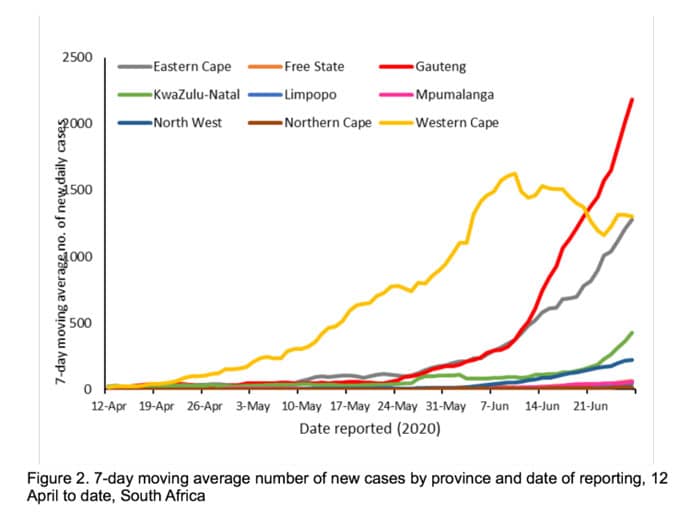Health minister Zweli Mkhize said last night health authorities expected Gauteng would emerge with the highest Covid-19 numbers ‘within the coming days’.
The following chart released by the health last night ‘clearly shows Gauteng’s steep upward curve denoting the largest surge in the country at present’, Mkhize said.

‘Factors contributing to this trend are inward migration; the large population (especially in metros like Johannesburg, Ekurhuleni and Tshwane); increased congregating which spurs cluster outbreaks; and the level to which people are able to adapt to new behaviours such as social distancing and the wearing of masks,’ Mkhize said.
‘We have been engaging the Gauteng MEC for Health as well as the Provincial Department to ramp up their capacity expeditiously.
‘In the next few days, the testing backlog will be cleared and the numbers we see will be based on a much shorter turnaround time. We have identified the need to increase COVID-19 hospital beds in this province and we will be supporting the province to ensure that they are capacitated to meet the rising demands.’
Mkhize said: ‘We are seeing a rapid rise in the cumulative number of positive COVID-19 cases indicating that, as we had expected, we are approaching a surge during the latter winter months of July and August.
‘It is anticipated that while every province will unfortunately witness an increase in their numbers, areas where there is high economic activity will experience an exponential rise – beginning with Gauteng and Western Cape and followed by Eastern Cape and KwaZulu-Natal.
‘We believe that within the coming days, Gauteng will emerge with the highest COVID-19 numbers.’
Positive cases in South Africa grew by 6 334 yesterday to 138 134 (with 68 925 recoveries), and 43 deaths brought the total to 2 456.
The health minister said the ‘surge that has been witnessed in the past two weeks has developed due to seeding of infections carried in by members of the community as they moved back into the workplace’.
It was ‘inevitable” that there would be cluster outbreaks as infections spilled over from communities into places of congregation such as mines, factories, taxis and buses.
Besides regular hand washing, social distancing and the correct wearing of masks at all times, ‘early case detection, contact tracing, quarantine and isolation are the key armaments we have in our toolbox to break the cycle of infection’.
Meanwhile, taxi association Santaco said it would resume transporting passengers at 100% capacity today.
This followed the cancellation of a meeting with taxi operators yesterday by Transport Minister Fikile Mbalula. Operators have been negotiating with the government on being allowed to carry more passengers, and to cross provincial borders.
Mbalula’s spokesperson Ayanda Allie-Payne said: ‘The minister needs to hear from the [National Coronavirus Command Council] what their final decision will be regarding the inter-provincial travel, as well as the 100% loading capacity that the taxi industry is asking for. That’s only going to happen on Tuesday (tomorrow).’
Santaco president Phillip Taaibosch said the decision to resume 100% carrying capacity today was taken because the association had received no cooperation from government after scheduled meetings with Mbalula never materialised, according to a News24 report.
Taaibosch said Santaco was aware that taxis could be impounded, but said that, should this happen, member drivers would be forced to park all their taxis until the impounded ones were released.
Weekend reports by City Press and Rapport highlighted mounting problems with failing health standards and lack of infrastructure at public hospitals – particularly in the Eastern Cape.
The City Press report said provinces were running out of funds needed to create infrastructure to help cater for growing numbers of Covid-19 coronavirus patients.
It quoted Western Cape Transport and Infrastructure MEC Bonginkosi Madikizela as saying that the funding issue was alarming because the province needed to secure more quarantine facilities to ensure citizens were not left in the lurch.
Rapport quoted health professionals in the Eastern Cape as claiming that the Eastern Cape healthcare system had ‘collapsed’.
One doctor said: ‘We are sitting with a situation where patients are lying in the corridors of hospitals like Livingstone in Port Elizabeth and are dying, and there may soon be a similar situation Dora Nginza in Zwide.’
An Eastern Cape doctor said: ‘Many of them need oxygen, but there is not enough for everyone. So, those without oxygen are fighting those who do have it to try to ‘steal’ it. Sick people are fighting each other. It is literally a ‘survival of the fittest’ situation. It is awful.’
In other virus-related news
- AFP reported that more than 10 million cases had been officially declared around the world, half of them in Europe and the United States. At least 10 003 942 infections, including 498 779 deaths, had been registered globally. Europe remained the hardest hit continent with 2 637 546 cases and 195 975 fatalities, while the US had 2 510 323 infections and 125 539 deaths. The rate of infections worldwide continued to rise, with one million new cases recorded in just six days. The news agency noted that its data, collected from national authorities and information from the World Health Organisation (WHO), ‘probably reflect only a fraction of the actual number of infections. Many countries are testing only symptomatic or the most serious cases and some do not have the capacity to carry out wide-scale testing’.

